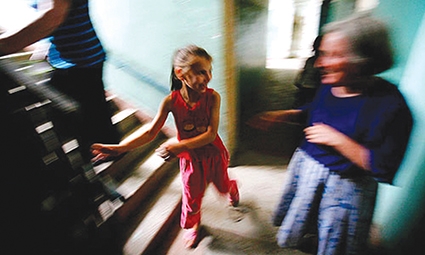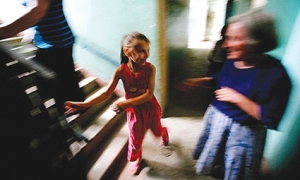Helping the IDPs: One Student’s Story
Every child has the right to be protected from harm. These rights are among the ones set out in the Convention on the Rights of the Child. Agencies such as UNICEF (United Nations Children’s Fund) are committed, in Georgia and world-wide, to ensuring special protection for the most disadvantaged children- victims of war, disaster, extreme poverty, all forms of violence and exploitation, and those with disabilities.
In Georgia in the early 1990s, the conflicts in Abkhazia and Tskhinvali regions resulted in the displacement of over half a million people. Further displacement took place in 2008 following an armed conflict with Russia. The majority of ethnic Georgians who fled Abkhazia and then Tskhinvali region/South Ossetia, have not yet been able to return. In accordance with data from the Ministry for Internally Displaced Persons from the Occupied Territories, Accommodation and Refugees of Georgia (MRA), there were 256,528 Internally Displaced Persons (IDPs) in Georgia as of 31st December 2010, of which 65,412 were under the age of 18. Most IDPs originate from Abkhazia and over 60 percent live in the cities of Tbilisi, Zugdidi and Kutaisi. Internally displaced children can be found living in very poor conditions, suffering the psychological trauma of displacement. Not fully integrated locally and facing social stigma that leads to feelings of inferiority and further isolation, they also need health care and education.
Following the 2008 war, the Government of Georgia quickly realized that returning the IDPs might not be feasible in the foreseeable future and that measures needed to be taken to promote their social-economic integration; improve their living conditions; reduce their dependency on the State, and to coordinate activities with the international community. The government then began to develop standard operating procedures with the assistance of the UNHCR, aimed at improving the protection of IDP rights. IDPs from both groups receive monthly cash benefits disbursed by the Social Services Agency (SSA). Most children displaced as a result of the war in August 2008 were enrolled in new schools within three months.
To date the author of this article has made a great deal of investigation into the topic of Internally Displaced Children in Georgia but also by fund-raising for Internally Displaced Children.
On 19-21st October 2015, the author organized a three-day football tournament with accompanying ‘bake sales’ in order to raise money for IDP children, carried out with the involvement of many volunteers. The funds raised (500 GEL) were transferred to the No2 IDP school in Vashlijvari. The author also visited said school where she met the director, Nana Jalagonia, to discuss conditions and problems within the school. At school there are 28 certified and qualified teachers. Pupils there study the Georgian curriculum with the addition of studies in the Aphazian language, which is an elective subject from Grade 10. The school is small, occupying just one floor, and is attended by 107 students of which 77 are IDPs from Abkhazia and South Ossetia. As the director highlighted, the mix of IDPs and local students is essential for the IDPs to better integrate and to establish their place in society.
Director Jalagonia’s desire is to make the lives of these children a little easier through her school and students. On the second floor of the school was the place where the IDP children were growing up (following displacement). Over 10 families were forced to share one bathroom. The school, as Director Jalagonia rightly points out, is their life.
While the funds raised were initially set out by this author to buy encyclopedias for the school, Director Jalagonia explained that the number of books currently at the school is sufficient as the government annually provides them a variety of books.
THE AUTHOR SAYS:
“I’ll never forget the happiness of the school director- she wasn’t before able to imagine such kindness. I know that 500 GEL is nothing for these people, but I think the feeling that they have someone willing to help them is very important. We (myself and my school-mates) went into every class and saw the kind, happy and thankful faces as the children heard about my own school and its aims to raise money for them. While talking to them, I thought I was talking to students who were being educated in the most expensive schools. Despite the poverty of their current ‘home,’ they had something special- the richest imagination and steady belief in the future. I hope that our school contribution will be supported by other organizations and I do believe that other schools will follow our steps to help the No.2 IDP School in Vashlijvari.
Tinatin Meskhi is a 10th Grade student at the New School International School of Georgia. She participated in the 5th Platon School Model United Nations conference in Athens (Greece) on Children’s Rights in the 21st Century.
Tinatin Meskhi












